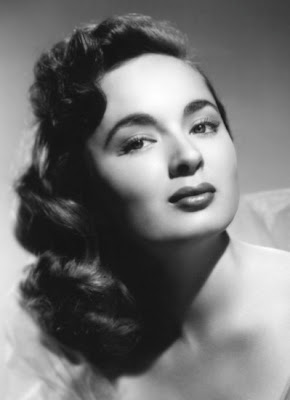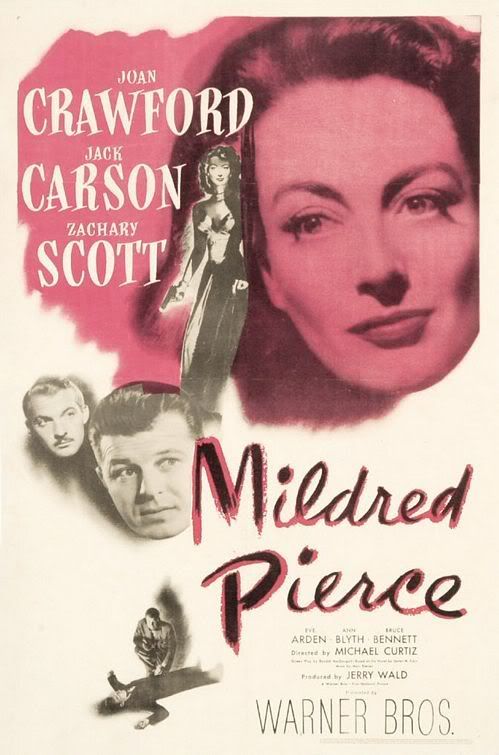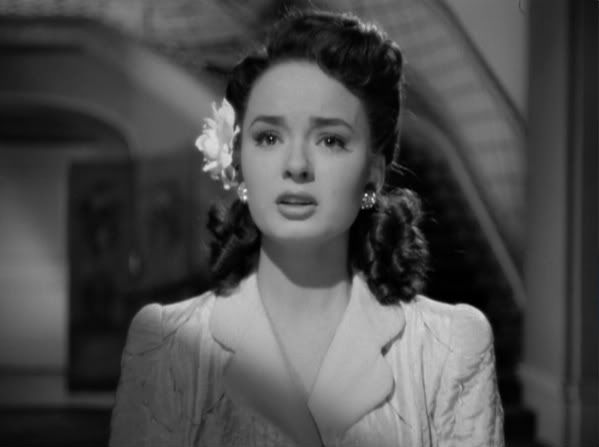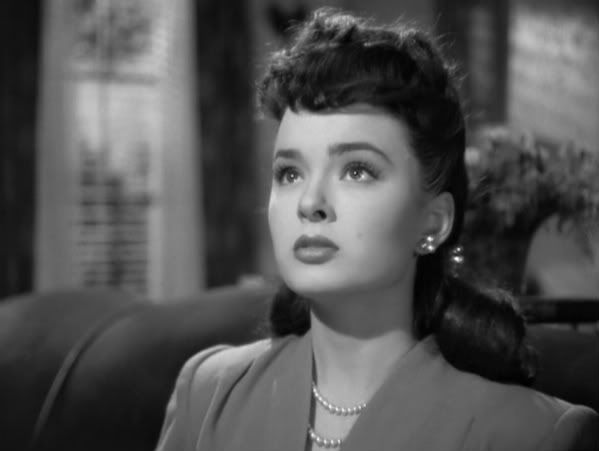 At long last...
At long last...My introduction to Ann Blyth came through what is possibly her 2nd-most legendary performance, as a 1970s-era spokesmodel for Hostess snack cakes. I remember, as a wee lil stinky, watching these commercials (in which the elegant Blyth serves Twinkies on the finest china) and just longing for my grandmother to fall under Ann Blyth's spell, to suddenly realize that "freshness never tasted so good" as when it came in plastic-wrapped single servings. But, alas, my grandmother never fell under Ann Blyth's sway in that way. I, however, did -- so much so that was appalled at my recurring, involuntary cravings for such Hostess goodness every time I, since December, screened (and rescreened) the most deservedly legendary performance by...


...Ann Blyth in Mildred Pierce (1945)
approximately 28 minutes and 50 seconds
30 scenes
roughly 26% of film's total running time
 When we first meet her, Blyth's Veda is shocked and confused by the police's interest in her mother and, even as the police cart her off, Crawford's Mildred assures her daughter that everything will be fine. In this scene, Blyth delivers a compelling "first hit" of the character as a guileless innocent, as a sweet girl naïve to the world and concerned only for her mother's welfare. This scene -- in which Blyth's Veda stands as a vision of daughterly sympathy and concern -- provides the essential foundation for the deft characterization that is to follow.
When we first meet her, Blyth's Veda is shocked and confused by the police's interest in her mother and, even as the police cart her off, Crawford's Mildred assures her daughter that everything will be fine. In this scene, Blyth delivers a compelling "first hit" of the character as a guileless innocent, as a sweet girl naïve to the world and concerned only for her mother's welfare. This scene -- in which Blyth's Veda stands as a vision of daughterly sympathy and concern -- provides the essential foundation for the deft characterization that is to follow. In our next encounter with Blyth's Veda, it's several years prior, when the character's a precocious schoolgirl.
In our next encounter with Blyth's Veda, it's several years prior, when the character's a precocious schoolgirl. The film quickly establishes -- both through the character's actions and through what is said about her by others -- that Blyth's Veda is something of a bad seed, a cruelly demanding and manipulative little girl concerned with little beyond her own superficial gratifications.
The film quickly establishes -- both through the character's actions and through what is said about her by others -- that Blyth's Veda is something of a bad seed, a cruelly demanding and manipulative little girl concerned with little beyond her own superficial gratifications. What we learn about Veda -- her selfishness, her delight in humiliating her hardworking mother, her meanness -- stands in startling tension with our first encounter with her in that early scene.
What we learn about Veda -- her selfishness, her delight in humiliating her hardworking mother, her meanness -- stands in startling tension with our first encounter with her in that early scene. Did this awful creature become nicer as she matured? Or is something else going on? I wonder... As Mildred's life hurtles forward (a child dies; a successful fried chicken franchise is established; multiple suitors are juggled; shoulderpads are worn), Mildred's every action is driven by her single-minded determination to make life better for Veda.
Did this awful creature become nicer as she matured? Or is something else going on? I wonder... As Mildred's life hurtles forward (a child dies; a successful fried chicken franchise is established; multiple suitors are juggled; shoulderpads are worn), Mildred's every action is driven by her single-minded determination to make life better for Veda. At the same time, Veda becomes ever more awful.
At the same time, Veda becomes ever more awful. As scene upon scene depicting Veda's vile selfishness unfurls, this much becomes clear: Mildred may have spoiled Veda, but Veda became rotten all on her own.
As scene upon scene depicting Veda's vile selfishness unfurls, this much becomes clear: Mildred may have spoiled Veda, but Veda became rotten all on her own. When Blyth's Veda cruelly manipulates a naïve young man into falling in love with her, Crawford's Mildred is appalled at her daughter's selfish cynicism. In the confrontation that follows, Blyth impressively holds her own against Crawford's forceful screen charisma. (I'm not sure I'm ever convinced that Blyth could "take" Crawford, but I am certain that the match would prove an entertaining contest.) In this scene, as well as in those that follow (in which Blyth's rotten selfishness compels Veda, by turns, to get closer to her mother before once again forcing distance between them), Blyth is really fun to watch.
When Blyth's Veda cruelly manipulates a naïve young man into falling in love with her, Crawford's Mildred is appalled at her daughter's selfish cynicism. In the confrontation that follows, Blyth impressively holds her own against Crawford's forceful screen charisma. (I'm not sure I'm ever convinced that Blyth could "take" Crawford, but I am certain that the match would prove an entertaining contest.) In this scene, as well as in those that follow (in which Blyth's rotten selfishness compels Veda, by turns, to get closer to her mother before once again forcing distance between them), Blyth is really fun to watch. Yet, for me, the performance lacks reasoning and Blyth does little to illuminate an internal integrity or motive for Veda’s essential awfulness.
Yet, for me, the performance lacks reasoning and Blyth does little to illuminate an internal integrity or motive for Veda’s essential awfulness. Don't get me wrong. I get it that Veda's petty, selfish, and immature brat who blames her mother for everything. That said, I submit that Blyth demonstrably relishes Veda's short-sighted cleverness as well. Unlike Crawford (who wafts through every scene playing the same basic motive: "I am mother; I am woman; oh the conflict!"), Blyth's performance is a little busier, with a touch more complexity in some ways but with markedly less clarity in more.
Don't get me wrong. I get it that Veda's petty, selfish, and immature brat who blames her mother for everything. That said, I submit that Blyth demonstrably relishes Veda's short-sighted cleverness as well. Unlike Crawford (who wafts through every scene playing the same basic motive: "I am mother; I am woman; oh the conflict!"), Blyth's performance is a little busier, with a touch more complexity in some ways but with markedly less clarity in more. Blyth's performance is delightfully shaded and the actress is well cast in this role, especially opposite the likes of Crawford. Yet the performance remains for me more an elaborately ornamented bauble than a fully contoured performance. Blyth gives Veda excellent presence and panache but there's a vacuum where the character's animating passion might be.
Blyth's performance is delightfully shaded and the actress is well cast in this role, especially opposite the likes of Crawford. Yet the performance remains for me more an elaborately ornamented bauble than a fully contoured performance. Blyth gives Veda excellent presence and panache but there's a vacuum where the character's animating passion might be. Ann Blyth's work in the role of Veda is, for me, an utterly captivating but ultimately negligible concoction. Not unlike a Hostess snack cake, really. Absolutely delightful in its way but never quite as good as you want it to be.
Ann Blyth's work in the role of Veda is, for me, an utterly captivating but ultimately negligible concoction. Not unlike a Hostess snack cake, really. Absolutely delightful in its way but never quite as good as you want it to be.
9 comments:
do all those flowers growing on her over the years have anything to do with her mean spirits?
StinkyLulu, in your opinion how does Blyth's performance as Veda compare to those of, say, Fredi Washington in Imitation of Life (1934); Anne Shirley in Stella Dallas; Susan Kohner and Sandra Dee in Imitation of Life (1959); Diane Varsi in Peyton Place; or Caroll Baker in Giant?
I'm not sure, Paul.
It's been quite a while since I've considered some of the films you mention (though the 1959 Imitation of Life will be in my sights in the next few weeks).
I do think the "ingrate daughter" character was skewed in the earlier period by an idealization of the mother-daughter relationship, especially on the mother side. When I think of later films like Foxes and Terms of Endearment and even Only When I Laugh, I find the mother/daughter confrontations much more compelling. It's a tough "stock character" to play and Blyth does very well with it.
Well worth the wait !!! Thanks again for a great Smackdown on one of my favorite years !!!
Hooray! I'm glad you posted this profile (and the link to that very funny Hostess commercial clip).
I'm friends with Ann Blyth's great-niece, and I sent her (meaning my friend, not Ann Blyth) the link to this review and to the 1945 Smackdown. I'm not sure if she's passed the links on to Ann herself, but she got a kick out of the commercial and enjoyed the write-up.
Yet the performance remains for me more an elaborately ornamented bauble than a fully contoured performance. Blyth gives Veda excellent presence and panache but there's a vacuum where the character's animating passion might be.
Perhaps the problem was not Blyth's performance, but the screenwriters' fault. It is possible that Ranald MacDougall,
William Faulkner and Catherine Turney were so busy painting this awful portrait of this selfish and cruel young woman that they had failed to give her some kind of depth, which you would find in other villainous characters.
It might be the screenplay, but I can't help but feeling it's about "someone" regulating Blyth's performance so it doesn't pitch Crawford's off its self-consciously precious perch.
Blyth clearly has the goods to find her own angle on Veda's awfulness, but something's stopping her. Part of why I love watching actressing at the edges comes from catching great actresses in minor roles make magic out of beans. Something's confining Blyth from doing that here and it's not clear who/what/why.
I love Blyth in this, but I don't disagree with your critique. The role is one-dimensional (growing up, I remember reading a mini-review wherein the critic stated something to the effect of "Ann Blyth as Veda is the one character you have to except as real to enjoy the movie"- I wondered what the writer meant, until I finally saw the film). I don't think it's really that hard for a young actress to "score" in it- act vile and showy, and the impact is made. I like Blyth's energy, and the fact she makes you believe Veda could keep Crawford as Mildred in line, but she doesn't really humanize Veda for us.
I don't think Veda can be humanized. She's a psychopath who is dead inside and feels no remorse for any action she undertakes. The emotional blankness behind the actress's eyes even when smiling clues the viewer in far before the script exposes her in full. It seems that the only person she truly cared for other than herself was her sister Kay and once she was gone Veda let nothing as small to her as conscience stand in her way. When the cancerous pit viper that Blyth has created say to Mildred in parting "Don't worry about me mother, I'll get by." you know it's only too true and the mind reels at what she'll be capable of doing to "get by".
It's a real shame that this was the only villain Ann ever undertook becoming mired in musicals and supportive wife roles. Perhaps she chose that path or the studio discovering she could sing and her porcelain beauty photographed so well in color didn't allow her to venture beyond it but based on this performance she could have had a much more varied career in the Jane Greer vain.
Post a Comment